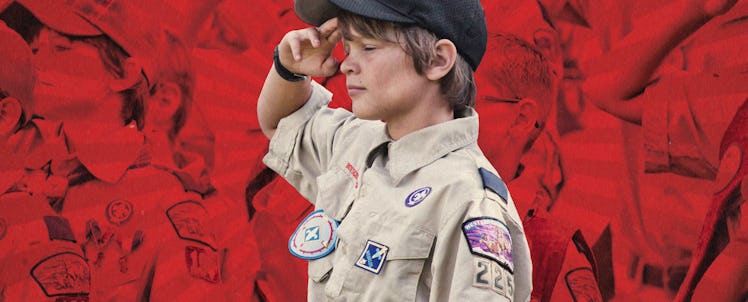The Case For Boy Scouts 2.0
Boy Scouts of America failed at the moment boys needed the organization more than ever.

Growing up, my dad taught me how to clean a fish, change a tire, and how to build a compass from scratch. I’ve forgotten how to do at least two of these three things and, like most people, rely heavily on Google when confronted with the right way to chop wood. My dad knew how to do these things and my grandfather knew how to do these things at least in part because they grew up participating in Boy Scouts of America. As of right now — amid a landslide of sexual abuse lawsuits — the Boy Scouts have filed for bankruptcy. In newsrooms across the country, not-quite-obituaries (someone in the org has a badge for debt restructuring) are being written for the Boy Scouts, but the borderline tragic truth is that rumors of the organization’s death have been understated. The organization fell on its own Swiss Army knife two generations ago.
My father was an Eagle Scout, but specifically did not put me in the Boy Scouts because of his belief that aspects of the Boy Scout culture were “weird.” This is to say that he understood that, like the Catholic Church, the organization seemed designed in part to facilitate abuse. He was not alone. A lot of dads made similar decisions.
Still, my dad was an earlier adopter of suspicion toward scouting. There were concerns that I would be left out. I wasn’t. The organization was fading from relevance. The upside of that, of course, was that predators within the ranks had fewer opportunities. The downside, best visible through the lens of data, is that the oldest organization in America devoted to the wellbeing of boys shat itself to death just as that work became critical.
According to studies from 2019, 60 percent of the people who “ who achieve less than the baseline level of proficiency,” in standard educational goals are boys. Young males are also at an all-time high for suicide risk. All of this points to a very real crisis in America. Boys have low self-worth and rates of male suicide are skyrocketing. Coping mechanisms are needed. Sources of pride are needed. Outdoor time is needed. And where are the Boy Scouts? In depositions, I guess. Nowhere to be seen — having abandoned the post.
Which is why it’s time for Boy Scouts 2.0.
Boy Scouts of America is on the brink of nonexistence because several thousand people committed horrific sexual crimes, not because the generous and inspiring goals of the organization were bad. In our collective rush to teach children to be useful, we sometimes forget to teach them to be good. The Boy Scouts conflated these things in a powerful and encouraging way. The scouts were all about teaching boys to be good people (and archers).
It’s right there in the oath.
“A Scout is…TRUSTWORTHY A Scout tells the truth. He keeps his promises. Honesty is part of his code of conduct. People can depend on him. LOYAL A Scout is true to his family, Scout leaders, friends, school, and nation. HELPFUL A Scout is concerned about other people. He does things willingly for others without pay or reward. FRIENDLY A Scout is a friend to all. He is a brother to other Scouts. He seeks to understand others. He respects those with ideas and customs other than his own…”
There are no caveats when it comes to trustworthiness or friendliness (Ernest Hemingway famously said the best way to trust someone is to trust them). And that trust was broken. Bizarrely — but not uniquely — it was broken by those who preached its importance. They were right and they did wrong. The takeaway here isn’t that morally oriented organizations inevitably fail, but that this one did and the next one needs better leaders. We don’t need to keep the hats, or the little shorts, or the merit badges or even the outdoorsiness (though it’s nice) The next great American boy organization should share its values with the scouts and share its vetting process with the CIA. But, some version of it should exist.
Above all, what a future Boy Scouts 2.0 needs to retain is the idea that children can learn the value of not only being good but being good together. As the Boy Scouts reckon with the ugly truth of their own past, we can’t give up on the future of organizations designed to help boys and young men. The truth is that, like my father and now myself, many parents will never again trust the Boy Scouts. This has been true for a while. What has changed is not just the Boy Scouts’ financial status, but the opportunity for a different organization to replace a failed regime.
The future of scouting may not be scouting. And that might be fine.